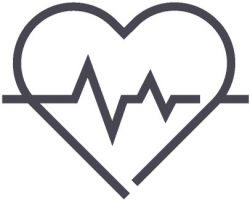Am I at risk for a heart attack or stroke? What is the best home blood pressure monitor? How do I take my blood pressure?
High Systolic Blood Pressure
When you visit your doctor, one of the first things that will be checked is your blood pressure. This is important because your blood pressure indicates how hard your heart is working. The heart comprises of four chambers and four valves. These valves open and close to allow blood to go to the chamber and eventually into the blood vessels. The human heart beats 60-100 times per minute, and as it beats, it forces blood against the artery walls.
High systolic blood pressure is a condition that occurs when your blood pressures surges to unhealthy levels. It refers to the amount of blood passing via the blood vessels and the amount of resistance it gets while the heart is pumping. The heart is responsible for pumping blood into blood vessels, which in turn transports blood to other parts of the body.
If your arteries are narrow, then the resistance will increase, resulting in high systolic blood pressure. High Systolic blood pressure does not develop overnight; it is a condition that develops with time. Most people don’t notice that they are suffering from this condition until it advances to more severe stages. Hypertension (another name for high blood pressure) is a serious condition that can damage your blood vessels and organs, including the brain, kidney, eyes and heart.
Regular blood pressure readings can help your physician detect if there are any changes in your systolic blood pressure. If your blood pressure rises, the doctor may prescribe medication and monitor it carefully over time to see if it returns to normal. If high systolic blood pressure is not treated in time, it could lead to other serious conditions, including stroke and heart attack.
What is the Difference between Systolic and Diastolic?
The role of the heart is to supply oxygen-rich blood to vital organs and tissues of the body. The heartbeat is caused by the heart muscles contracting and relaxing. The period of relaxation is referred to as diastole, while the period of contraction is referred to as systole.
Diastole occurs when the heart muscles relax. When this happens, the chamber of the heart is filled with blood, and your blood pressure decreases.
Systole, on the other hand, occurs when the heart muscle contracts. When this happens, the heart pushes the blood out of the heart into the blood vessels, which in turn transport the blood to all tissues and organs of the body. During systole, your blood pressure increases.
Causes of High Systolic Blood Pressure
The exact cause of high systolic blood pressure is unknown, but doctors believe several things increase your chances of developing this condition, including:
- Being overweight
- Smoking
- Too much salt in your diet
- High stress levels
- Older age
- Family history of high blood pressure
- Genetics
- Excessive alcohol consumption
- Thyroid and adrenal disorders
- Sleep apnea
- Side effects of medications
- Kidney disease
Symptoms of High Systolic Pressure
- Chest pains
- Frequent nosebleeds
- Headaches
- Flushing
- Blood in urine
- Vision changes
- Shortness of breath
Changes in Systolic Blood Pressure as You Age
Age is a known risk factor for high blood pressure. Generally, systolic blood pressure increases as you get older, while diastolic pressure tends to fall. The reason why systolic blood pressure increases with age is still unknown. However, doctors believe that it is a result of structural changes in the arteries and increased pulse pressure due to increased systolic blood pressure and decreased diastolic blood pressure.
Treatment Options for Systolic Blood Pressure
Before treatment is administered, your doctor will conduct various tests to discover the type of systolic blood pressure you have and its possible causes. If the doctor diagnoses you with primary systolic blood pressure, then he will recommend lifestyle changes, including exercise, changing your diet, getting enough sleep, and more to help reduce your blood pressure. If your blood pressure does not drop, then he will probably prescribe medications.
If the doctor discovers that a specific issue is causing your high systolic blood pressure, then the doctor will focus on treating that particular condition. For instance, if the medicine that you are taking is causing high blood pressure, then the doctor may recommend an alternative medication that doesn’t cause the same side effect.
Medications for High Systolic Blood Pressure
- Diuretics. This medication helps your kidneys to eliminate excess sodium from your body, thus reducing your blood pressure
- Beta Blockers. This medication makes your heart beat slower and with less force. As such, it lowers your blood pressure by reducing the amount of blood pumped via the arteries.
- Alpha-2 agonists. This medication helps to alter nerve impulses that cause blood vessels to tighten. It helps blood vessels to relax, lowering pressure.
- Angiotensin II receptor blockers. This medication helps to block Angiotensin from binding with receptors, thus preventing blood vessels from tightening.
- ACE inhibitors-. This medication helps to regulate the production of Angiotensin, a chemical that causes the artery walls and blood vessels to narrow and tighten.
- Calcium channel blockers. This medication helps to block calcium from entering your heart, thus lowering your blood pressure.
Home Remedies
- Healthy diet
- Increased physical activity
- Managing stress
- Losing weight
